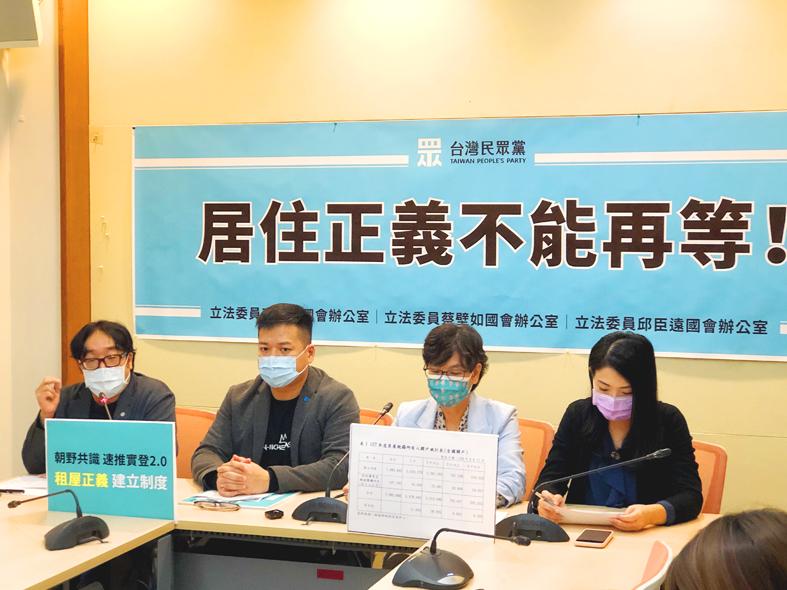The Executive Yuan yesterday proposed measures to help rein in real-estate prices, which have spiked due to “hot money” pouring into the local market.
Premier Su Tseng-chang (蘇貞昌), at a meeting in Taipei, instructed government officials to ensure that people could afford to buy a home.
Su said that housing is for residential purposes and should not become a commodity, Executive Yuan Secretary-General Li Meng-yen (李孟諺) told a news conference after the meeting.

Photo: Chen Yun, Taipei Times
The measures include stepping up reviews of so-called “pink form” transactions — used to place a reservation on a housing unit — by the Ministry of the Interior and local governments, the Executive Yuan said.
The ministry has also been tasked with amending the registration system of actual real-estate transaction prices to include individual units, instead of just general transactions, it said.
Measures to evade real-estate sales or purchasing taxes should also be investigated, it added.
The government is also considering adjusting loans for buyers of real-estate who do not intend to reside in the property, it said, adding that it was also urging banks to be cautious when considering loans requested by construction companies for new housing units.
If necessary, the central bank should intervene, while the Financial Supervisory Commission should also step up its reviews of real-estate loans to prevent speculation, the Executive Yuan said.
The government plans to build more social housing projects next year across 18 counties and cities, it said, adding that it would also increase the number of households eligible to benefit from subsidies to 120,000, up from 60,000.
That would be only the first wave of measures and should real-estate speculation continue, additional measures would be implemented, National Development Council Minister Kung Ming-hsin (龔明鑫) said.
Taiwan People’s Party (TPP) Legislator Tsai Pi-ru (蔡璧如) said that the Executive Yuan’s measures were only short-term cures, calling on the government to amend the registration system of actual real-estate transaction prices and to impose a tax on vacant properties.
TPP Legislator Ann Kao (高虹安) said that her party has proposed a bill that would allow users of the system to see housing units being sold in real time, empower authorities to review and approve data, and provide a legal basis for fines.

The US government has signed defense cooperation agreements with Japan and the Philippines to boost the deterrence capabilities of countries in the first island chain, a report by the National Security Bureau (NSB) showed. The main countries on the first island chain include the two nations and Taiwan. The bureau is to present the report at a meeting of the legislature’s Foreign Affairs and National Defense Committee tomorrow. The US military has deployed Typhon missile systems to Japan’s Yamaguchi Prefecture and Zambales province in the Philippines during their joint military exercises. It has also installed NMESIS anti-ship systems in Japan’s Okinawa

‘WIN-WIN’: The Philippines, and central and eastern European countries are important potential drone cooperation partners, Minister of Foreign Affairs Lin Chia-lung said Minister of Foreign Affairs Lin Chia-lung (林佳龍) in an interview published yesterday confirmed that there are joint ventures between Taiwan and Poland in the drone industry. Lin made the remark in an exclusive interview with the Chinese-language Liberty Times (the Taipei Times’ sister paper). The government-backed Taiwan Excellence Drone International Business Opportunities Alliance and the Polish Chamber of Unmanned Systems on Wednesday last week signed a memorandum of understanding in Poland to develop a “non-China” supply chain for drones and work together on key technologies. Asked if Taiwan prioritized Poland among central and eastern European countries in drone collaboration, Lin

TRAGEDY STRIKES TAIPEI: The suspect died after falling off a building after he threw smoke grenades into Taipei Main Station and went on a killing spree in Zhongshan A 27-year-old suspect allegedly threw smoke grenades in Taipei Main Station and then proceeded to Zhongshan MRT Station in a random killing spree that resulted in the death of the suspect and two other civilians, and seven injured, including one in critical condition, as of press time last night. The suspect, identified as a man surnamed Chang Wen (張文), allegedly began the attack at Taipei Main Station, the Taipei Fire Department said, adding that it received a report at 5:24pm that smoke grenades had been thrown in the station. One man in his 50s was rushed to hospital after a cardiac arrest

ON ALERT: Taiwan’s partners would issue warnings if China attempted to use Interpol to target Taiwanese, and the global body has mechanisms to prevent it, an official said China has stationed two to four people specializing in Taiwan affairs at its embassies in several democratic countries to monitor and harass Taiwanese, actions that the host nations would not tolerate, National Security Bureau (NSB) Director-General Tsai Ming-yen (蔡明彥) said yesterday. Tsai made the comments at a meeting of the legislature’s Foreign Affairs and National Defense Committee, which asked him and Minister of National Defense Wellington Koo (顧立雄) to report on potential conflicts in the Taiwan Strait and military preparedness. Democratic Progressive Party (DPP) Legislator Michelle Lin (林楚茵) expressed concern that Beijing has posted personnel from China’s Taiwan Affairs Office to its